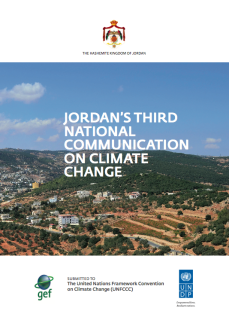Jordan's Third National Communication on Climate Change provides a scientifically sound description of the projected impacts of climate change on Jordan, as well as a comprehensive mitigation assessment and a detailed inventory of GHG emissions. The downscaling method was used to project the impacts of climate change in Jordan. It concludes that Jordan is a highly vulnerable country when it comes to the risks of climate change especially the decrease in precipitation and an increase in temperature and dry spells.
The report contains comprehensive vulnerability assessments for major developmental sectors in Jordan and identifies cost-effective opportunities for mitigation and adaptations that Jordan will pursue with the support of the international community. The report is structured in five chapters. Chapter 1 gives an overall introduction to the social, economic, political and environmental aspects of the country. Chapter 2 provides the methodology for greenhouse gas inventory and provides greenhouse gas emissions data. Chapter 2 also includes the comparison between the second and third national communication report. Chapter 3 includes a comprehensive mitigation assessment results that incorporate baseline and mitigation scenario. Chapter 4 contains vulnerability and adaptation assessment to climate change. Chapter 5 aims to provide a description of the current and proposed enabling environment for the implementation of the Third National Communication (TNC) and other national activities related to the UNFCCC framework and climate change in general. It also integrates climate change and national communications findings in sustainable development programmes.
As Jordan is one of the most vulnerable countries to the risks of climate change the country is undergoing a rapid and effective process of enhancing its institutional and policy-relevant framework for addressing climate change challenges. It is the first country in the Middle East to develop a national climate change policy in 2013 and has created a special directorate for climate change at the Ministry of Environment to act as a coordinating platform for all climate change activities in the country.

